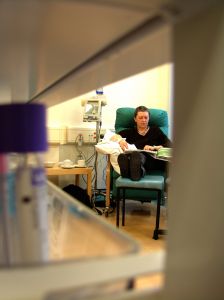
This is a continuation of the blog Standard of Care for the Diagnosis of Ovarian Cancer in Georgia parts one and two. These are more questions and answers as to why these questions are important in determining whether or not there has been a deviation from the Standard of Care for the Diagnosis of Ovarian Cancer in Georgia.
Q: What was the result of the transabdominal/transvaginal ultrasound?
A: This is important since the transvaginal ultrasonography (TVUS), when used as a sole screening intervention for high risk women, has not been effective in identifying early-stage ovarian cancer, and, therefore, should not be the sole screening method used in detecting ovarian cancer. The question then becomes, what other tests were run and were these tests appropriate given the symptoms in which the patient presented at the time of the examination.
Q: Did the clinician recommend scheduled follow up evaluations?
A: This is important since optimal follow-up for patients recovering from ovarian cancer must be individualized to the patient’s needs. If the proper follow up was not recommended and this resulted in the patient either being misdiagnosed or to becoming worse and more ill when there has been a diagnosis, then it can be argued that this was a deviation from the standard of care.
Q: Which of the following studies were performed?
A: This is important, as stated above, since a CAT Scan and/or MRI scanning may be used for assessing metastasis. Since ovarian cancer is difficult to detect other tests beyond the ultrasound can be performed to rule out ovarian cancer for the patient.
Q: Was a laparoscopy or laparotomy performed?
A: This is important since the diagnosis of a pelvic mass ultimately requires an exploratory laparotomy for confirmation. If a patient presents with symptoms that mimic or are indicative of ovarian cancer, then the physician should not stop at just an ultrasound and all necessary tests as have been discussed here should be performed and if these tests were not performed, then, again it could be argued that there was a deviation from the standard of care.
Q: Was a biopsy performed?
A: This is important since a biopsy is required to determine the cell pathology and ultimately determine the treatment plan and prognosis. If all tests point to the possibility of ovarian cancer, then a biopsy must be performed to determine if, in fact, this is ovarian cancer or a cyst. Without the biopsy, this will not be known with certainty.
Q: Was treatment advised, and was it the proper treatment?
A: This is important since if the tests indicate ovarian cancer, then without proper treatment the cancer will spread and metastasize and, eventually, death will occur. This is a disease that must be caught early if possible for hopes of the best chance of recovery. If there is no follow up treatment, then by the time another examination is performed it will, most likely, be too late to treat the cancer and give the patient the best chance of survival or quality of life for the most amount of time.
If you or a loved one has been misdiagnosed or mistreated for ovarian cancer, then contact us either by phone at 770-865-8654, or (813) 363-6664, by email at juliericelaw@outlook.com, or Contact Us through the contact form on this blog or on our website. We are experts in these types of cases and we are here to help you!